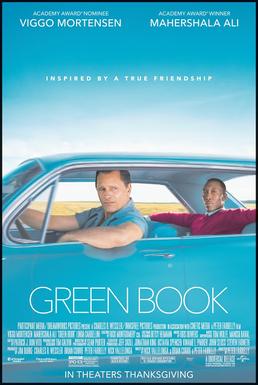
GREEN BOOK A DISCOURSE IN THE RACIAL DIVIDE
Posted January 20th, 2019 at 12:59 pmNo Comments Yet
IN REVIEW
COLOUR AND RACE IRRELEVANT PERSONAL CHARACTERISTICS
By PETER THOMAS BUSCH
Mahershala Ali plays not black enough to be black and not white enough to be white but a person getting introductions in both communities because of his world class musicianship in Green Book (2018).
Ali plays classical pianist Dr. Don Shirley in this biopic about an African American touring swanky white clubs through the American deep south.
Ali’s character needs not just a chauffeur but also a body guard because of the racial hatred during the early beginnings of the civil rights movement.

Director Peter Farrelly casts Viggo Mortensen as the muscle hired by the record company to ensure that the racism that they encounter does not prevent the classical trio from performing.
The narrative is as linear as the road forward all but for a couple of detours as Farrelly creates a discourse about the deep seated discrimination that prevented black people from enjoying the same sense of dignity and freedom as white people solely because of irrelevant characteristics.
Farrelly does a good job using the camera to describe the racial hatred as nothing more than irrational cultural norms based on colour and a history of treating black people differently than white people regardless of their abilities.
The script is a compelling dialogue that shows how a cultured African American was treated worse than a less cultured white Italian American.
Ali is able to assume the persona of Dr. Don Shirley by personifying the resolve of an educated black man to transform white thinking and black attitudes in deeply racially divided communities.
Ali won a Golden Globe for his outstanding performance. Ali has also won an Oscar for his supporting role in Moonlight (2016). Moonlight is a telling story about a boy growing up in a tough Miami neighbourhood.
Ali is also known for his portrayal of a Washington lobbyist in the Netflix Original Television Series House of Cards (2013-2016), starring Robin Wright.
Farrelly is able to create compelling scenes as the two characters drive further south making tour stops along the way.
The audience becomes captivated by the conversations in the car that the cultured black man has with the uneducated white man.
Mortensen plays a slow learning Italian mobster type character who has enough integrity and professionalism to take the job despite his racial bias.
Farrelly creates the expectation that the two characters will fight and not be able to finish the tour together.
The chauffeur though has too much respect for himself not to be loyal to his employer. The dignity of finishing a job is more important than anything else.
The film depends on the acting of Ali and Mortensen as much as the compelling story line that gradually reveals more and more of the separation between black and white.
Mortensen is best know as the ranger in Peter Jackson’s epic trilogy Lord of the Rings (2001, 2002, 2003).
Mortenson begins the trilogy as a lone rider named Strider when four hobbits stumble into the Inn of the Prancing Pony.
Strider is eventually revealed to be one of the great kings of man but he must earn the respect of the people around him before his true identity can become known.
Mortensen has adapted different biopic personas since appearing in the commercially successful trilogy.
In Hidalgo (2004), Mortensen plays an American cowboy taking part in a famous horse race.
In A Dangerous Method (2011), Mortensen plays Sigmund Freud opposite co-stars Michael Fassbender as Carl Jung and Keira Knightley as Sabina Spielrein in a biopic about the origins of psychoanalyses. Mortensen plays the more conservative Freud to the liberal upstart Jung and the vulnerable neurotic Spielrein.
Mortensen’s feature film debut was a small part as a young Amish man in the Peter Weir film, Witness (1985), starring Harrison Ford and Kelly McGillis.
In Green Book, Mortensen and Ali play mirror opposites gradually revealing the details about their character’s personas. The audience bonds with them more and more as the two characters’ relationship develops into a deep friendship.
Farrelly shows how the racial barriers can be eventually broken so that the white man no longer sees the black man as black man and the black man no longer sees everyone else as white.
The narrative is a good one but many of the scenes lack creativity. Too many scenes are shot in the car driving down the highway as part of the racial discourse. And too many scenes are shot in the concert halls as the musician plays to white audiences.
The casting is good with many unfamiliar faces fitting in well. Linda Cardellini plays a loving loyal Italian American women in charge of the household but she somehow still remains subject to the family patriarchy as Mortensen’s wife and mother of his two children.
Cardellini is the first to reach out to African Americans in the film, foreshadowing the film’s final objective.
Cardellini begrudgingly accepts her husband’s racism but she herself is undeterred in her own equal treatment of Black Americans with dignity.
The overall vision for the film is good with several scenes covering object lessons in the race divide.
The script is also good with an honest exchange of important ideas between two distinct cultures at odds with each other during the US President Kennedy Administration of the 1960s.